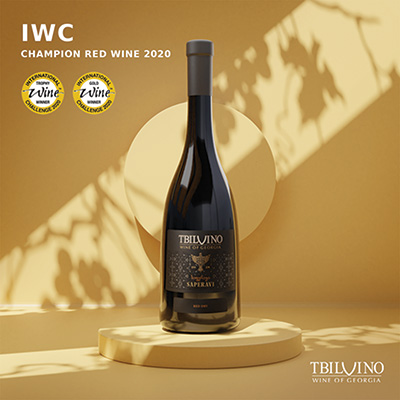Tbilvino for the win – how a 2018 Saperavi brought Georgia its first IWC Champion Red Trophy

2018 was a fantastic year across the vineyards in the world’s northern and southern hemispheres, with bountiful crops and idyllic weather. Unsurprisingly, therefore, wine of the 2018 vintage is already winning superlatives.
Georgia’s Tbilvino was hardly watching from the sidelines: while accustomed to prizes for its wines and being feted for its export performance, it was not expecting at the end of last year to find one of its 2018 Saperavis beating huge international competition to become the winner of a key top world prize.
This prize came from judges at the London-based International Wine Challenge (IWC) in which companies from over 90 countries compete. It was the first time a Saperavi had won such a prize. The International Wine Challenge panel awarded the Tbilvino 2018 Saperavi 97 points out of 100 (they were only one of four wines to achieve such a high score) and gave it the event’s Champion Red Trophy, the tasting notes describing it as:
“Viscous, electric and intense with amazing fruit and acidity. Ripe plum, damson and herbal fruit with a touch of floral perfume. Very youthful. Tremendous dark, style, black cherries, wild strawberries, liquorice and menthol, with chalky acidity and a long finish.”
Tbilvino’s hard work and investment in its land and production paid off in spades with the 2018 vintage. There was also an IWC gold medal for its Mukuzani Special Supply 2018 (which won 100 points out of 100), and at the equally prestigious Decanter awards its Mukuzani 2018 received 95 points out of 100 and another gold medal. In all, Tbilvino won 31 prizes at these two events.
“There are many reasons for this, but all of them are related to Tbilvino’s strategy to develop production processes, gain more knowledge and experience from international experts, introduce innovations, cultivate its own vineyards and produce the highest-quality wine,” says George Margvelashvili, who with his brother Zurab has owned and run Tbilvino since 1999, explaining the corporate strategy behind their successes.
The wine-making team is led by Zviad Loladze, who has been with Tbilvino for over 20 years. “He is always in search of novelty and tries to create distinctive wines with his team. He especially loves Georgian grape varieties and always tries to make the most of their potential,” explained Margvelashvili.
Describing the wine-maker’s approach to the process he says: “The goal of our team of winemakers is to bring strong varietal characteristics of Saperavi grapes to consumers in both Georgian and international markets; intense, ripe cherry color, balanced with soft tannins and strong taste-structure qualities. The wine was not intended for any particular type of consumer. Our team of winemakers is always trying to create a wine that will amaze wine lovers.”
The grapes for this prize-winning wine came from vines planted in 2015 in Tbilvino’s 128-hectare fertile Vachnadziani Valley in Kakheti’s Mukuzani microzone, which is 400-450 meters above sea level, on the right-hand bank of the Alazani River valley. (The IWC writers noted that Saperavi grown on the right-hand bank of the Alazani Valley is more tannic and sweeter than that from the left, where it is more acidic.)
The grapes were harvested by hand in the second half of September, 2018. There seems to have been rain and sun at the right times, with a wet May and June, dry July, unusually wet August, and a hot and dry in August and September in the run-up to the harvest.

The production process used stainless steel tanks, in which fermentation takes place at a controlled temperature (23-28 degrees celsius) using a pure culture of yeast.
After eight to ten days of maceration, the wine was removed from the pressed skins (chacha) and transferred to another stainless-steel tank, where it underwent secondary (malic) fermentation. Then, some of the wine was aged in stainless steel tanks, and part in French and American 225-liter oak barrels for three months (the latter giving red-fruit flavor and adding soft vanilla and light tones of oak to the wine). These batches were then reassembled, lightly filtered using a tangential filter, and bottled.
The main winery, in Tbilisi, was revamped in 2008, and the newer one in Kvareli (with backing from the World-Bank-affiliated International Finance Corporation), located among the vineyards, opened in 2012. Both wineries are equipped with the latest technologies, but at Kvareli the focus is on qvevri wines, while the French oak barrels for the premium line of ‘special reserve’ wines are in Tbilisi. The wineries operate to ISO 22000 and ISO 9001 standards.
One of Georgia’s largest wine companies, Tbilvino has been growing steadily in domestic as well as international markets, with last year’s production reaching 5.4 million bottles. Post Covid-19, local sales are helped by an online store and delivery services. Exports markets range from, of course, Russia and Ukraine, but also Kazakhstan, the Baltic countries, the U.S., and across Europe and the UK.
In the UK, Tbilvino wine can famously be found, if you are lucky, at Marks & Spencer.
The Margvelashvili brothers’ international search for good partners to help develop their business extends beyond just export markets. To help review management processes, a Japanese expert in the philosophy of kaizen has been brought in, whose creed is, “There are no best results, anything CAN be improved.”
Tbilvino is even partnering with a leading Italian vine nursery to grow a supply of certified Georgian Saperavi grape seedlings that will be cultivated on 82 hectares of land in the village of Eniseli, in Kakheti’s Kindzmarauli microzone.
The quest, as ever, says Margvelashvili, “is always the same – we just produce [wine] with the highest quality.”

